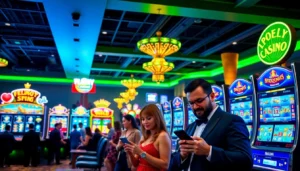Empowering Your Lifestyle: Strategies to Enhance Well-being and Balance

Understanding the Essence of Lifestyle and Its Impact on Daily Living
In today’s fast-paced world, the concept of lifestyle has become central to personal identity and societal development. It encompasses a wide range of interests, behaviors, and values that shape the way individuals and communities live, work, and interact. From technological influences to cultural shifts, modern lifestyles are continuously evolving, reflecting both aspirations and challenges faced by society. Recognizing the significance of lifestyle helps individuals make informed choices that enhance their overall well-being and foster sustainable growth.
Defining Lifestyle: Interests, Behaviors, and Values
At its core, lifestyle refers to the distinctive way of life adopted by individuals or groups, influenced by their interests, attitudes, beliefs, and cultural norms. It includes daily habits such as diet, leisure activities, social interactions, and health practices. For example, a health-conscious individual may prioritize nutritious eating and regular exercise, shaping a lifestyle centered around wellness. Conversely, others may focus on cultural pursuits or technological engagement. Understanding these components offers insights into personal and collective identities, influencing everything from consumer behavior to community participation.
Global Trends Shaping Modern Lifestyles
The 21st century has witnessed transformative trends that redefine lifestyles globally. The surge of digital technology has fostered remote work, virtual socialization, and access to endless information, leading to a more interconnected world. Urbanization continues to amplify the demand for innovative living spaces and green environments, emphasizing sustainability. Furthermore, health and wellness culture are expanding, with increased awareness of mental health, organic foods, and fitness regimes. Socially, inclusivity and diversity are shaping new norms that promote acceptance and individual expression. These trends collectively mold a modern lifestyle that values flexibility, authenticity, and eco-consciousness.
Linking Lifestyle Choices to Personal Well-being
Optimal lifestyle choices have a profound impact on personal well-being. Scientific studies demonstrate that balanced diets, regular physical activity, and mental health practices can significantly reduce risks of chronic diseases and improve life satisfaction. For instance, incorporating mindfulness and stress management techniques helps maintain mental clarity and emotional resilience. Moreover, social connections foster a sense of belonging, which is vital for mental health. Thus, cultivating a lifestyle that aligns with individual values and health needs not only extends lifespan but also enhances the quality of life, leading to increased productivity and happiness.
Key Components of a Healthy and Balanced Lifestyle
Physical Activity and Fitness Routines
Regular physical activity is a cornerstone of a healthy lifestyle. Engaging in activities such as walking, cycling, weight training, or yoga improves cardiovascular health, boosts immune function, and enhances mood through endorphin release. Experts recommend at least 150 minutes of moderate exercise weekly, tailored to individual capabilities. Incorporating variety and enjoyment into fitness routines increases adherence and prevents burnout. Additionally, workplace wellness programs and community sports initiatives are effective methods to promote physical activity across populations.
Nutritional Choices for Optimal Health
Nutrition profoundly influences vitality and longevity. Emphasizing whole foods—fruits, vegetables, lean proteins, whole grains, and healthy fats—supports optimal bodily functions. Reducing processed foods, added sugars, and excessive salt is vital to prevent diseases like obesity, diabetes, and hypertension. Tailoring diets to personal needs, cultural preferences, and ethical considerations (e.g., vegetarianism, food allergies) ensures sustainability. Educating consumers about nutrition encourages healthier choices, fostering a culture where dietary habits contribute positively to mental and physical health.
Mental Wellness and Stress Management
Mental health is an integral component of overall well-being. Practices such as mindfulness meditation, regular social interactions, and pursuing hobbies can mitigate stress and reduce anxiety. Cognitive-behavioral techniques and professional counseling are valuable tools for managing mental challenges. Employers and educational institutions increasingly recognize the importance of mental wellness programs, offering resources like stress reduction workshops and mental health days. Prioritizing mental health not only improves individual resilience but also enhances productivity and interpersonal relationships.
Practical Tips for Cultivating a Productive Lifestyle
Time Management and Setting Priorities
Effective time management empowers individuals to balance work, leisure, and personal growth. Techniques such as the Pomodoro Technique, task batching, and priority matrices help streamline daily routines. Setting SMART (Specific, Measurable, Achievable, Relevant, Time-bound) goals fosters focus and achievement. Regularly reviewing priorities ensures alignment with long-term aspirations. Creating dedicated periods for rest and reflection prevents burnout, ensuring sustained productivity and mental clarity.
Integrating Technology for Better Lifestyle Management
Technology offers innovative solutions for lifestyle enhancement. Wearable devices track physical activity, sleep patterns, and vital signs, providing actionable data. Mobile applications facilitate diet planning, meditation, and mental health monitoring. Virtual communities and online courses expand educational and social horizons. However, mindful usage is critical to avoid over-reliance or digital burnout. Establishing boundaries and leveraging technology to automate routine tasks allows for more meaningful engagement with one’s environment and community.
Creating Sustainable Habits and Routines
Building sustainable habits requires consistency, patience, and a supportive environment. Starting small—such as a five-minute morning stretch or daily hydration—reduces resistance. Habit stacking, where new behaviors are added to existing routines, enhances adoption. Reinforcement through tracking progress and rewarding milestones sustains motivation. Cultivating a growth mindset encourages resilience against setbacks. Integrating these practices fosters a resilient lifestyle adaptable to life’s inevitable changes.
Innovative Trends in Lifestyle Enhancing Personal and Professional Growth
Smart Living and Home Automation
Automation technologies are transforming homes into efficient, sustainable spaces. Smart thermostats adapt to occupancy patterns, reducing energy consumption. Voice-activated assistants streamline daily tasks and enable seamless control of lighting, security, and entertainment systems. These innovations promote convenience while conserving resources, aligning with eco-friendly aspirations. Integrating AI-driven appliances can optimize routines, save time, and improve comfort, contributing to a more sophisticated lifestyle.
Digital Detox and Mindful Usage of Devices
With the pervasive influence of digital devices, intentional disconnection becomes vital. Practicing digital detoxes—setting specific times to unplug—improves focus, creativity, and mental clarity. Strategies include establishing tech-free zones, turning off notifications, and engaging in offline activities like reading or outdoor recreation. Cultivating mindfulness around device usage reduces dependency and fosters authentic social connections. This balance enhances overall well-being and cultivates a more intentional lifestyle.
Future Lifestyle Trends and Predictions
Looking ahead, lifestyle evolution will likely be driven by advancements in technology, sustainability, and social values. Concepts like virtual reality social spaces, personalized health monitoring, and sustainable urban living are expected to gain prominence. The rise of remote work will further decentralize traditional workplace environments, fostering flexible lifestyles. Emphasis on mental health, inclusivity, and eco-consciousness will shape future societal norms, creating a more adaptive and resilient way of living.
Measuring Success: How to Track and Improve Your Lifestyle
Setting Realistic Goals and Milestones
Achieving a balanced lifestyle begins with clear goal-setting. Using SMART criteria ensures goals are well-defined and attainable. Periodic milestones serve as checkpoints, providing motivation and clarity. For instance, a goal of walking 10,000 steps daily can be broken into weekly targets, fostering a sense of progress. Tracking these objectives with journals, apps, or coaching helps maintain focus and adjust strategies as needed.
Utilizing Apps and Tools for Lifestyle Monitoring
Digital tools play a critical role in lifestyle management. Apps like MyFitnessPal, Headspace, or sleep trackers provide insights into habits and health metrics. Data visualization enables users to identify patterns and areas for improvement. Integration with wearable devices allows seamless data collection, facilitating personalized adjustments. Leveraging these technologies enhances accountability and accelerates progress toward desired lifestyle changes.
Adapting Strategies Based on Personal Progress
Flexibility is essential to sustained lifestyle improvement. Regularly reviewing progress and soliciting feedback fosters continuous refinement. If certain habits prove unsustainable, alternatives should be explored. For example, swapping high-impact workouts for gentle stretching can maintain activity levels. Cultivating a growth mindset encourages learning from setbacks, ensuring that lifestyle evolution remains a positive and achievable journey.







